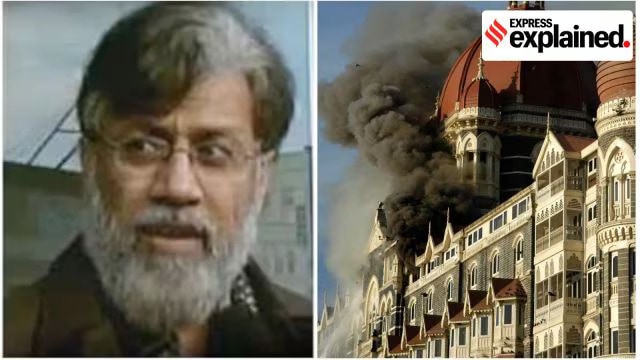Tahawwur Rana on way to face justice in India. What is the story of the extradition of this Mumbai 26/11 terror attack accused?
Mumbai 26/11 Accused Tahawwur Rana: The Pakistani-origin Rana had been fighting a legal battle in the US since he was first arrested in 2009, going from court to court seeking to stay on in the US. In March 2025, the US Supreme Court finally rejected his plea against extradition.
 Rana is being extradited on the basis of the India-US Extradition Treaty signed by the two countries in 1997. (File)
Rana is being extradited on the basis of the India-US Extradition Treaty signed by the two countries in 1997. (File)Tahawwur Rana Extradition: A National Investigation Agency (NIA) team is now in the United States to take custody of 2008 Mumbai terror attack accused Tahawwur Hussain Rana.
The United States Supreme Court last month rejected Rana’s plea against his extradition to India.
Rana, 64, had filed an “Emergency Application For Stay” after President Donald Trump approved his extradition following his meeting with Prime Minister Narendra Modi in February.
Rana is being extradited on the basis of the India-US Extradition Treaty signed by the two countries in 1997. The NIA team left India for the US on Sunday after receiving confirmation of the ‘surrender warrant’, sources said.
A surrender warrant in the US is the document required to surrender a fugitive criminal to a foreign state.
What is the story of Rana’s arrest and the legal process that followed?
Rana is accused of aiding and abetting the reconnaissance for the 26/11 attacks carried out by David Coleman Headley, with whom he went to school in Pakistan, and of participating in the conspiracy.
This is his story, from 2009 onward.
* Rana was arrested in Chicago in October 2009 for his involvement in the 26/11 attacks, in which more than 180 people were killed. He was also accused of providing material support, during 2008-09, to an attack planned by would-be Islamist terrorists on the Danish newspaper Jyllands Posten.
The Jyllands Posten plot was busted in December 2010, and the plotters, who had allegedly planned a “Mumbai-style” attack, were arrested. The Islamist militants had allegedly planned to punish the Copenhagen-based newspaper for having published cartoons depicting the Prophet in 2005.
* The US District Court for the Northern District of Illinois prosecuted Rana for conspiracy to provide material support to terrorism in India and Denmark, and to the Pakistan-based Lashkar-e-Taiba terrorist group.
The jury acquitted Rana of the charge of conspiring to provide material support to terrorism in India, but convicted him on the other two counts. On January 17, 2013, Rana was sentenced to 168 months (14 years) in prison.
* On June 9, 2020, Rana was released on compassionate grounds.
* But a day later, a Magistrate Judge in California, where Rana was serving his sentence, signed a provisional arrest warrant with a view to extraditing him to India based on an extradition request from December 2019. Rana opposed his extradition on the ground of “double jeopardy”, a procedural defence that seeks protection from being tried again on same or similar charges after an acquittal or conviction has already taken place.
* On May 16, 2023, an extradition Magistrate Judge rejected Rana’s arguments. Rana then petitioned the US District Court for the Central District of California for a writ of habeas corpus.
* This was rejected on August 10, 2023. Rana then appealed in the Court of Appeals for the Ninth Circuit. This too was rejected.
* Rana then filed a writ of certiorari in the US Supreme Court, which was rejected on January 21 this year.
* Finally, after Trump announced his extradition last month, Rana filed the emergency application in a last-ditch attempt to stay in the United States.
And what is the India-US extradition treaty?
The treaty, which was signed in June 1997, established a legal framework for the extradition of individuals charged with or convicted of serious offences in either country.
An offence is extraditable if it is punishable by imprisonment for more than one year under the laws of both countries.
Political offences are not extraditable under the India-US treaty. However, certain actions such as the murder or other willful crime against a Head of State/ Government or a member of their family, aircraft hijacking and aviation sabotage, crimes against internationally protected persons, and hostage-taking, etc., are not construed as “political offences” under the treaty.
As of 2023, India had “extradition treaties” with 48 countries, and “extradition arrangements” with another 12.
How did the provisions of the treaty play out in Tahawwur Rana’s case?
Following his provisional arrest in 2020, US authorities had submitted in court that Rana should be cleared for extradition to India as his offences and legal situation met all criteria required under the extradition treaty between the two countries.
They said there was “probable cause to believe that Rana committed the offences” of which he had been accused in India.
The US government submitted that it was not proceeding on Indian charges such as “membership of a terror organisation”, “conspiracy to wage war”, and “conspiracy to commit terrorist act” because they did not fulfil the criteria of “dual criminality”.
However, “the dual-criminality requirement (of the extradition treaty) is met because the remaining charged offences are punishable in both India and the United States”, the US said.
Rana claim of “double jeopardy” – arguing that India intended to prosecute him for the same offences of which he had been acquitted by the Chicago court – was rejected by the US Court of Appeals for the Ninth Circuit on the ground that the Indian charges had “elements” distinct from the charges under which he had been prosecuted, and eventually acquitted, by the Chicago court.
The court held that “India [had] provided sufficient competent evidence to support the magistrate judge’s finding of probable cause that Rana committed the charged crimes.”
Before Rana, have there been other extraditions to India from the US on charges of terrorism?
There have been only two extraditions of alleged terrorists from the US to India so far – alleged Khalistanis Charanjeet Singh Cheema and Kulbeer Singh Kulbeera alias Barapind in February 2005 and June 2006 respectively.
According to data provided by the Ministry of External Affairs to Parliament, the treaty facilitated the extradition of only 11 Indian fugitives from the US between 2002 and 2018.
One of these individuals was accused of the sexual abuse of children, another of attempt to murder. The rest were accused of financial fraud and cheating.
The government recently told Parliament that 65 requests for extradition remain pending with the US government.
Has the US ever rejected a request for extradition from India?
Yes, the US has rejected several requests for extradition from India, most importantly that of Rana’s associate Headley.
The Lashkar operative who was born Daood Gilani was arrested along with Rana in October 2009. He was tried and sentenced by a US court for the killing of six Americans in the Mumbai attacks after he pleaded guilty to the charges. One of the key terms of his plea bargain was that he would not be extradited to India.
The US had earlier rejected India’s request to extradite Warren Anderson, who was CEO of Union Carbide at the time of the 1984 Bhopal gas leak.
Anderson had been arrested by police in India, but he was soon given bail and allowed to leave the country.
Almost 20 years later, in May 2003, India sent a request for his extradition to the US, which was declined on the ground of insufficient evidence.
This is an edited and updated version of an explainer that was first published on March 8, 2025.
- 01
- 02
- 03
- 04
- 05






































